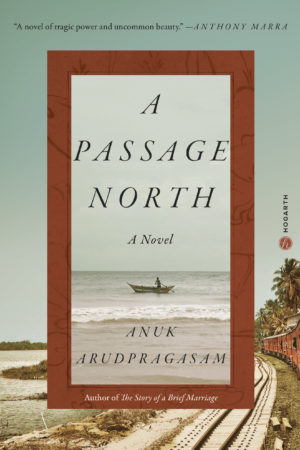A Passage North
by Anuk Arudpragasam
reviewed by Franklin Nelson
In Anuk Arudpragasam’s searching new novel, shortlisted for this year’s Booker Prize, someone from the past may be dead, but the past itself is not. Set in Colombo in the years after the end of the Sri Lankan Civil War, A Passage North opens with Krishan, its protagonist, answering the telephone and learning of the death of Rani, his grandmother Appamma’s former caretaker. Meanwhile, someone else who used to figure in Krishan’s life has contacted him out of the blue: Anjum, his activist ex-girlfriend, whom he met while studying for a doctorate in Delhi, has emailed, her “deliberate and yet quietly lyrical” sentences “t[elling] very little of her life and ask[ing] very little of his too.”
From these two messages flows the rest of the novel, as Krishan, preparing for the journey northward to Rani’s funeral, embarks on a mental journey, revisiting past moments and reflecting on their significance for him and for his country. Here, Arudpragasam’s scrupulous, poetic observation comes into its own. The drag of a cigarette, Appamma’s sleeping habits, the male gaze on Delhi’s public transport system, what it means to be free (“nothing more than the ability of the ciliary muscles in each eye … to loosen and relax at will”).
In its treatment of the Civil War, A Passage North recalls Arudpragasam’s DSC Prize-winning debut, The Story of a Brief Marriage, except it does so at one remove. Where characters in that first novel live through the war, here they live with memories of it. Rani mourns her two sons, the younger of them “struck by a piece of shrapnel in the stomach” on the eve of the war’s end. Krishan, meanwhile, has lost his father in a bombing coordinated by the Tamil Tigers. Though apparently “insulated from the traumas of the war,” Krishan’s unwillingness to engage with his father’s life and legacy suggests otherwise.
Of this novel, Garth Greenwell asserts: “it’s difficult to think of comparisons for Arudpragasam’s work among current English-language writers.” That may be true, but his work certainly compares to that of one writer, whom he cites as an influence: Marcel Proust. There is the profound relationship between grandparent and grandchild. There is the deep anxiety over matters amorous: as with Proust’s protagonist and Albertine, Krishan is perturbed by Anjum’s bisexuality. Above all, there are the lengthy sentences, as though with the accretion of detail that comes with each clause, we are edging closer to the truth of something:
Falling in love, or what deserved to be called falling love [sic], he had realized that night, was not so much an emotional or psychological condition as an epistemological condition, a condition in which two people held hands and watched in silent amazement as the world around them was slowly unveiled, as the falsities of ordinary life began to thin and dissolve before their eyes, the furrowed eyebrows and clenched jaws, the bright colors and loud noises, the surface excitements and disturbances all dropping away so that what remained—time stripped bare—was the only way the world could truly be apprehended, so that even if this condition did not last, even if it was lost, as eventually it is always lost, to habit or circumstance or simply the slow, sad passage of the years, the knowledge that it has imparted remains, the knowledge that the world we ordinarily partake in is somehow not quite real, that time does not need to pass the way we usually experience it passing, that somehow it is possible to live and breathe and move in a single moment, that a single moment could be not a bead on an abacus of finite length but an ocean that can be entered into, whose distant shores can never be reached.
Literary and historical digressions, like the tales of Siddhartha Gautama and Poosal, ground readers in the subcontinental scenario, all the while returning us more deeply to Krishan’s situation as a socially mobile young adult unsure where his future lies: at the center or at the periphery, in the academy or in the world of activism. In an artful closing triptych of chapters, Krishan accompanies Rani’s body to and then watches its burning. Just as the nature of her death is left unresolved, so too do the characters remain unfixed and unfinished. They seem to go on, living in the war’s wake, remembering and working through their quotidian dreams, desires, and devastations.
Published on December 14, 2021

